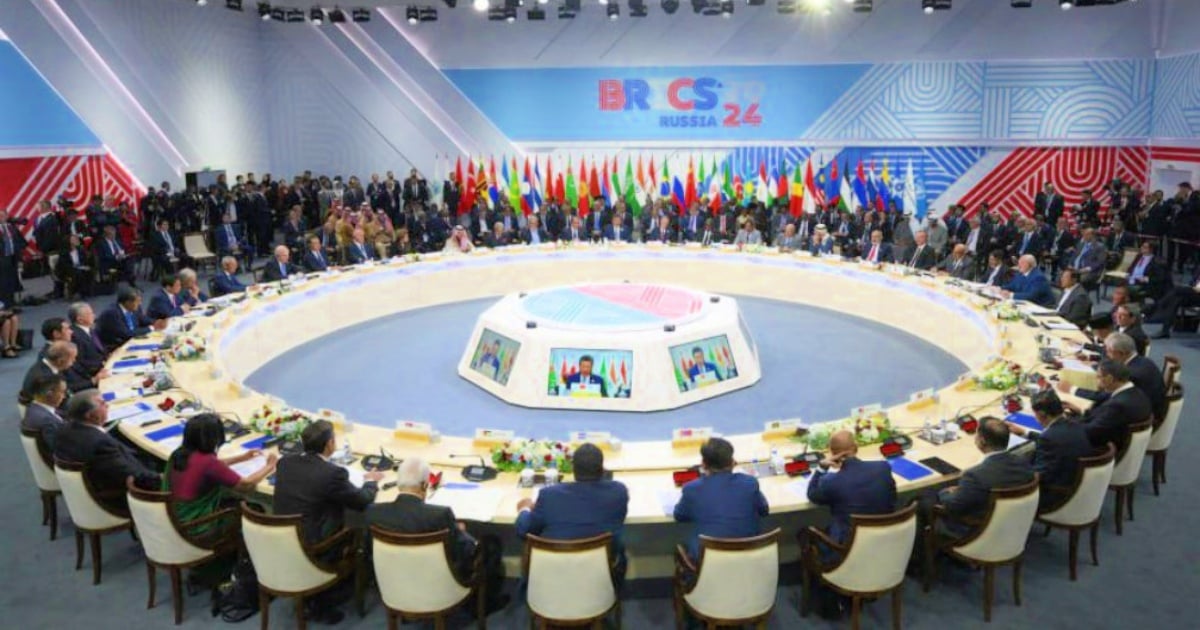At the 16th BRICS Summit, which wrapped up on Thursday in Kazan, Russia, Cuba was welcomed alongside 12 other nations as an "associate member" of the group. This strategic move by BRICS signals a potential pathway towards full membership for these countries, now regarded as "partners." Besides Cuba, the new associate members include Algeria, Belarus, Bolivia, Indonesia, Kazakhstan, Malaysia, Nigeria, Thailand, Turkey, Uganda, Uzbekistan, and Vietnam, all of which boast stronger economies than Cuba.
While this partnership status does not grant full rights, it is seen as a significant step towards eventual full membership in upcoming expansions. "Cuba is honored to join as a partner country in the BRICS, five letters symbolizing great hope for the Global South, on the challenging journey towards a more just, democratic, equitable, and sustainable international order," wrote Díaz-Canel on X this Friday.
Bruno Rodríguez, the Cuban Foreign Minister, echoed this sentiment, stating, "Cuba, by being accepted as a partner country of BRICS, reaffirms its interest and commitment to join and work alongside its members in defense of multilateralism, peace, international law, and the development and cooperation agenda that addresses the priorities of the South."
In a prior message, Rodríguez expressed Cuba's intent to share its "valuable experiences and outcomes across diverse areas" for the benefit of member nations and their people, a statement that sparked debate among Cubans questioning the island's contributions given its current socio-economic situation.
Rodríguez further noted in another post that "Cuba views with immense satisfaction how BRICS prioritizes addressing the current global food and energy crises, with positive experiences validated in many of its member countries."
The Summit's Highlights and Cuba's Absence
During the event in Russia, Cuban Foreign Minister Bruno Rodríguez Parrilla explained the absence of Miguel Díaz-Canel, citing Cuba's recent energy crisis and the impact of Hurricane Oscar. Rodríguez Parrilla attributed these challenges to U.S. economic sanctions, which he claimed restrict the island’s access to essential fuels and spare parts.
Expressing gratitude for the summit invitation, the minister highlighted the strategic role of the BRICS group and emphasized the potential of the bloc's New Development Bank as a favorable financial alternative for the Global South. According to Rodríguez Parrilla, the bank and the mechanism for local currency reserves spearheaded by BRICS offer "a more inclusive international financial architecture."
Venezuela and Nicaragua Excluded from BRICS Expansion
Russian President Vladimir Putin emphasized that the inclusion of new partners was conducted organically and responsibly. Venezuela and Nicaragua were notably excluded from this expansion phase, reportedly due to Brazil's opposition, citing a "loss of trust" in the Venezuelan government. Celso Amorim, advisor to Brazilian President Luiz Inácio Lula da Silva, clarified that the decision was not based on political regime but on reliability in relationships, as reported by Brazilian media.
BRICS: A Potential Economic and Political Counterweight
The summit concluded with a unified condemnation of unilateral sanctions lacking UN support, underscoring their detrimental effects on vulnerable populations. Representing 45% of the global population and 35% of the world's economy, BRICS proposed establishing a standalone payment infrastructure called "BRICS Clear," aimed at complementing the current financial system and reducing reliance on the U.S. dollar.
The final communiqué covered strategic themes such as geopolitics, drug trafficking combat, and advances in artificial intelligence. More than 20 global leaders attended the summit, including Chinese President Xi Jinping, Indian Prime Minister Narendra Modi, and Iranian President Masoud Pezeshkian.
For Cuba, participating in this forum bolsters its involvement in initiatives like China's Belt and Road and the Eurasian Economic Union, thus strengthening its position as a BRICS partner and paving the way for future alliances in strategic sectors such as biotechnology and healthcare.
